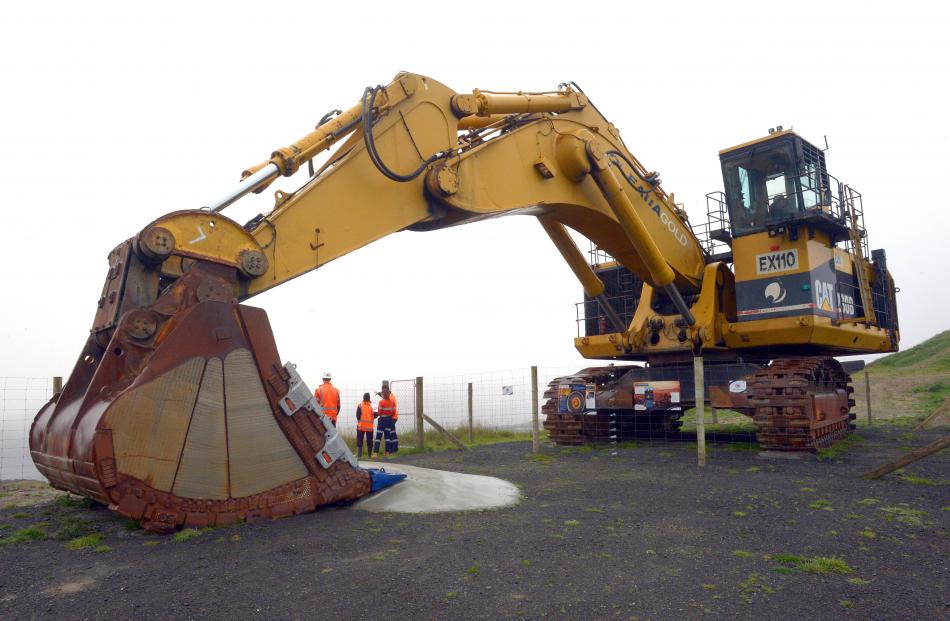A New Zealand mining company looking for gold north of Dunedin could sustain hundreds of jobs for years to come with its proposed expansion, but environmentalists are concerned the mine is taking the path "of least environmental integrity" as it seeks approval.
Business reporter Tim Scott digs into both sides.
A controversial Bill is absolutely not "a war on nature" and would streamline a complicated process, a mining executive says.
But an environmental group disagrees, saying the mining company is choosing the path "of least environmental integrity".
A proposed expansion of OceanaGold’s Macraes gold mine, north of Dunedin, was announced in October as one of 149 projects selected for inclusion in the Fast-track Approvals Bill.
The expansion — referred to as the Macraes Phase 4 (MP4) Project — would extend the life of the mine to about 2030 by expanding current operations and revisiting previously mined areas.
It would allow for more than 650 directly employed workers and thousands of indirect jobs to be maintained potentially until the mid-2030s, depending on drilling.
OceanaGold senior vice-president, legal and public affairs, Alison Paul said resource consent studies for MP4 began about two years ago.
The project was "very complex and large", required many permits and consents and needed to be consented within a timeframe that allowed for the site to operate and develop.
It had met all the requirements to be eligible for selection into the Bill, along with its other proposed expansion at its Waihi North site.
Whether MP4 was ultimately consented under the Bill or the Resource Management Act (RMA) would come down to timing — if the Bill was fast enough, if some of OceanaGold’s consents needed to be completed in a more conventional way and if the fast-track process "can do justice to the project".
Ms Paul said she did not think the Bill was "a war on nature".
"When I read [the Bill] and I look at the information requirements and the powers of the expert panel, and the consultation that is required and the parties with whom it is required, I do not think that nature will suffer at the end of that if it is implemented properly.
"And I think there is a lot of ways to hold that process to account to make sure it is implemented properly."
It required reports from iwi authorities and councils — which were typically advised by their own specialist experts — and permits would be enforced by the usual regulatory authorities, with the application having to detail consultation up front.
Overall, there was new accountability that did not exist under the current system, Ms Paul said.
The Bill would reduce some inefficiency and the "destruction of value" that arose from a "very disparate, very complicated, very various system", she said.
The RMA had become "so complicated" with many different instruments and processes to understand what needed to be done to manage the effects of a project.
"It’s just not that simple right now and it really ought to be ... and I absolutely do not accept that it is a war on nature."
Ms Paul said the Bill was the first attempt in New Zealand at a "one-stop shop" and she thought the simplification and streamlining aspects it brought to the table should remain as part of the consenting process.
While being more efficient, it needed to achieve the "same ultimate standard" as the RMA — which for OceanaGold meant ensuring impacts were, in the first instance, avoided and thereafter able to be remedied, mitigated, offset and compensated for.
A clear consenting pathway was something the company relied upon because it could not always avoid or remedy the impact of its projects, she said.
"So the extent which a one-stop shop, streamlined process allows that to be approached in a more holistic way, I think is for us quite important.
"And what we find with the current process is that they aren’t holistic; they’re piecemeal."
The outcomes under one statute could also be slightly different from the outcomes under another.
"We would like to see all of that streamlined for big, complicated projects. Otherwise, it becomes very confusing."
The way she read it, the Bill had at least the same information requirements as the RMA, or greater for certain statutes, and it also empowered a panel to say no if the adverse consequences of a project outweighed its benefits.
"I can see the reason for people’s concern, but I think it will come down to the standard of the applications that expert panels are willing to accept and the conditions that they put on people’s approvals."
While it was not her place to offer reassurances about the other projects listed on the Bill, she had never found a panel of commissioners to be "an easy day out", she said.
"And I don’t think councils who will be there with their own independent experts will be an easy day out, nor will the Department of Conservation.
"I don’t think, at the end of the day, that a proposer of a project rocking up who has not done pre-consultation with the community it is going to impact, with Doc, with iwi — I don’t think they are going to find it a fast or a simple project and they might not get the outcome they’re looking for in terms of the conditions that they’re given."
Under the Bill, the expert panel could "stop the clock" and extend the timeframe for complicated projects.
But it would be "foolish" for applicants to go into the process without having done the work first.
"There will be companies that are tempted to do it, and I would expect the Environmental Protection Authority [EPA] to be rejecting some in their completeness assessment.
"I would be expecting expert panels to be stopping the clock and telling applicants to go away and do more work.
"That could happen to us because we’ve got big complicated projects, and sometimes, best will in the world, you’ve missed something.
"It could happen, so I’m not promising it wouldn’t happen, but we’re going to go into the process aiming to have done all of our homework."
Forest & Bird Otago-Southland regional conservation manager Chelsea McGaw said it had "major concerns" about the "environmentally destructive activities" that would be approved under the Bill.
The Bill had a purpose which did not provide for environmental protections and overrode the environmental and conservation purposes of the Conservation, Reserves and Wildlife Acts, as well as the RMA and law governing the exclusive economic zone, among others.
Expert panels would be limited in their ability to consider environmental impacts, and local and regional economic benefits would have primacy over environmental effects.
"Ultimately, this means that the legislation does not provide for the environmental protections that are needed in the midst of a climate and biodiversity crisis.
"This is fundamentally different from previous resource management and fast-track legislation and opens the door to environmental damage without the necessary checks and balances."
Ms McGaw said the RMA already contained a fast-track process, in addition to the Covid-19 Recovery (Fast Track Consenting) Act.
The Covid-19 Recovery Act had been working well and of the 120 listed and referred projects on the EPA website — as of mid last month — 95 had been approved, 8 declined, 13 were in progress and 4 withdrawn.
The fast-track law OceanaGold would be using for MP4 was about overriding multiple environmental and conservation laws, and the company would be opting to take the "consenting path of least environmental integrity", she said.
Ms McGaw said the Bill had been designed to enable activities that could not happen at present due to environmental impacts.
"The bar also looks to have been set low — it’s very easy to promote regional and national benefits of a project.
"We believe nature needs to be invested in, instead of destroyed, as it creates a long-term economic benefit to the economy through tourism, ecosystem services, climate change mitigation and so on."
The ability of community groups and other parties to have a say had been curtailed, and given the key role these parties played in informing projects, this seemed at odds with Ms Paul’s belief the Bill had the same information requirements as under the RMA, Ms McGaw said.
The RMA was a "tried and true process" with case law to support it.
Although it could be improved, it provided safeguards for nature, in most cases put the environment first and maintained a delicate balance between economic, environmental and social interests, she said.
"[The Bill] laughs in the face of our international commitments to climate change and biodiversity, and is the result of a short-term-thinking government making long-lasting decisions."
Ms McGaw said fast-track legislation needed to be seen in the context of wider resource management reforms.
"Fast-track is at the vanguard of a series of regressive policies — a war on nature — which are completely at odds with what we need to be doing, and indeed, other developed countries are prioritising."

















